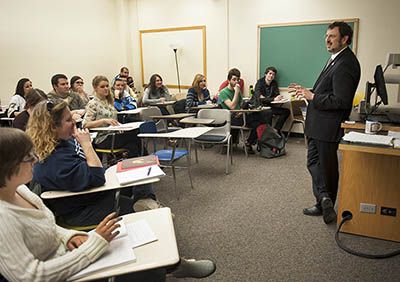President Michael Driscoll has appointed a journalism faculty member as his associate for strategic visioning.
In this role, Associate Professor Michele Papakie will lead a team of students who will spend the rest of the calendar year facilitating the next steps in the IUP strategic visioning project.
Papakie has enlisted the help of students in her Public Relations Presentation Making class this semester to turn her preliminary proposal into a plan and to begin executing the plan before the semester's end.

President Michael Driscoll spoke with students who'll participate in the IUP strategic visioning process under the direction of Professor Michele Papakie.
According to Papakie, the 30 students are “champing at the bit” to get started.
“When I first presented the idea to the class, the students were stunned,” she said. “They had a lot of questions, but when they realized what a monumental opportunity this is for both their résumés and their legacies at IUP, they said they couldn't wait to get started.”
Driscoll also lauded the opportunity for IUP.
“I am very pleased that we can advance IUP utilizing the expertise of our own faculty and providing students with the hands-on learning experience for which IUP is known,” he said. “Dr. Papakie brings a wealth of experience and energy to the project, and our students will be a great asset in getting the job done.”
During the first year of his presidency, Driscoll has worked to engage IUP's stakeholders in developing a shared vision for the future. He has been asking two questions:
- What is it that makes IUP distinctive?
- What would they like to see IUP celebrate at its sesquicentennial celebration in 2025?
The student team's first assignment is to research the visions, missions, core values, and strategic plans of each university in the Pennsylvania State System of Higher Education. They will also examine PASSHE's overall plan for the system.
Next, they'll learn how to facilitate groups and manage brainstorming sessions that will include members of various publics, including students, faculty and staff members, administrators, alumni, community leaders and business owners.
Papakie and her students will create a brief presentation that will explain the goal of each group interview. “Then, the students will take their show on the road,” she said.
The format of the group interviews will be for the students to guide participants through a SWOT (strengths, weaknesses, opportunities and threats) analysis, which will explore their perceptions of the following: the way IUP can capitalize on its strengths, diminish its weaknesses, maximize its opportunities, and limit the consequences of its external threats.
Participants will also be asked to answer Driscoll's two questions.
When the semester ends, Papakie will interview journalism students to secure a team of 10 who will continue the project through the summer.
The information gathered through these sessions will be carefully documented and entered into qualitative analysis software. Interviews will also continue throughout the summer until the team believes it has captured enough information from IUP's various stakeholders.
“Dr. Driscoll has dedicated some funds to this project, so I can pay each student a stipend for this summer work,” Papakie said. She is hoping some of the students may be able to treat the experience as an internship as well.
“Either way, this experience will enhance their learning and better prepare them for their careers,” she said.
In the fall, Papakie will teach a Public Relations Campaigns course, and she hopes to engage students in that class to take the research and planning to the execution level of strategic visioning for IUP.
Those interested in participating in the group interviews may leave a message for Papakie at (724) 357-1401 with contact information or send her e-mail at michele.papakie@iup.edu. Members of the student team will also invite people to participate.
“If you happen to be invited to participate in a group interview, I encourage you to make the time to participate,” she said. “We need to hear from a variety of members of our community to help to determine the strategic direction of our university.”